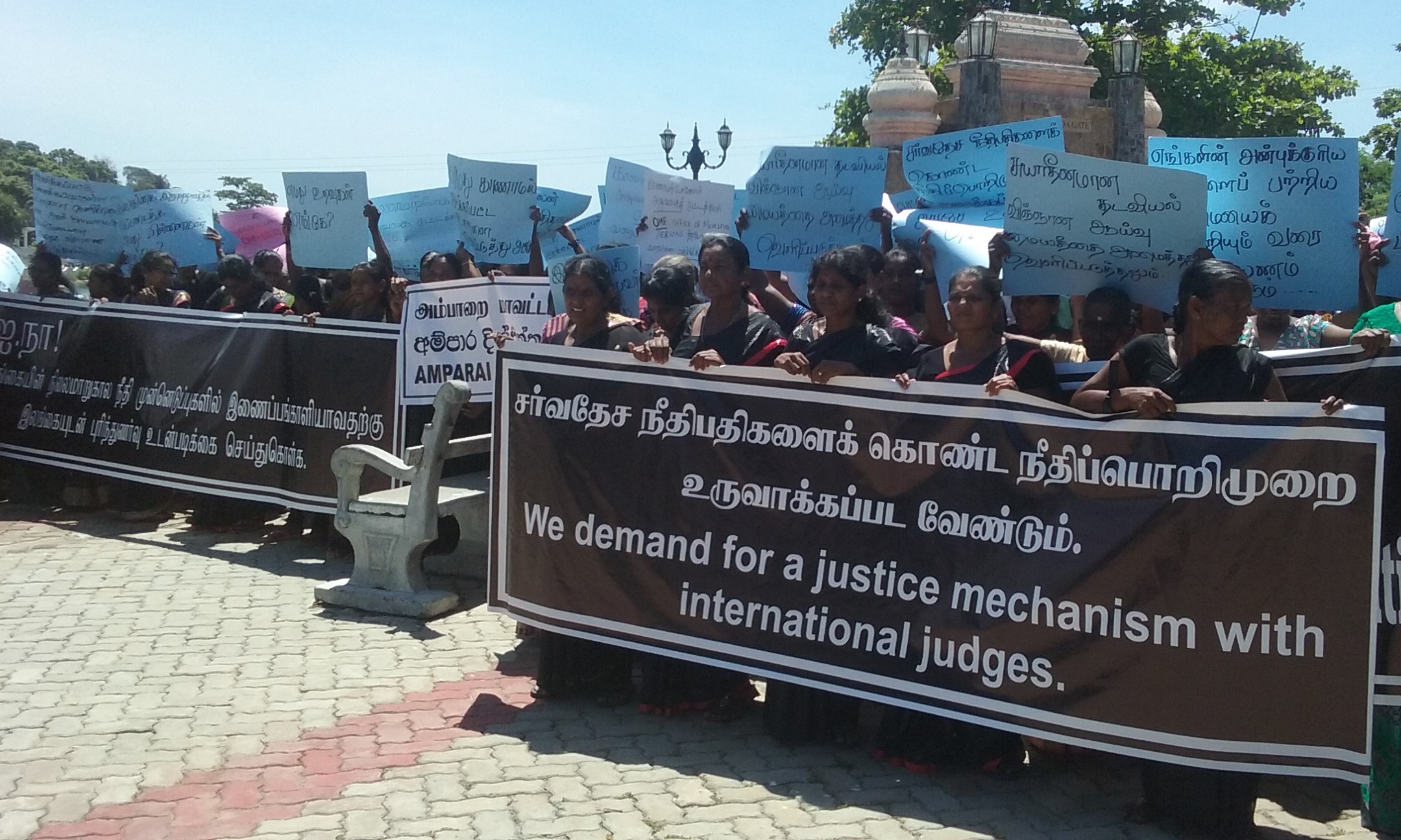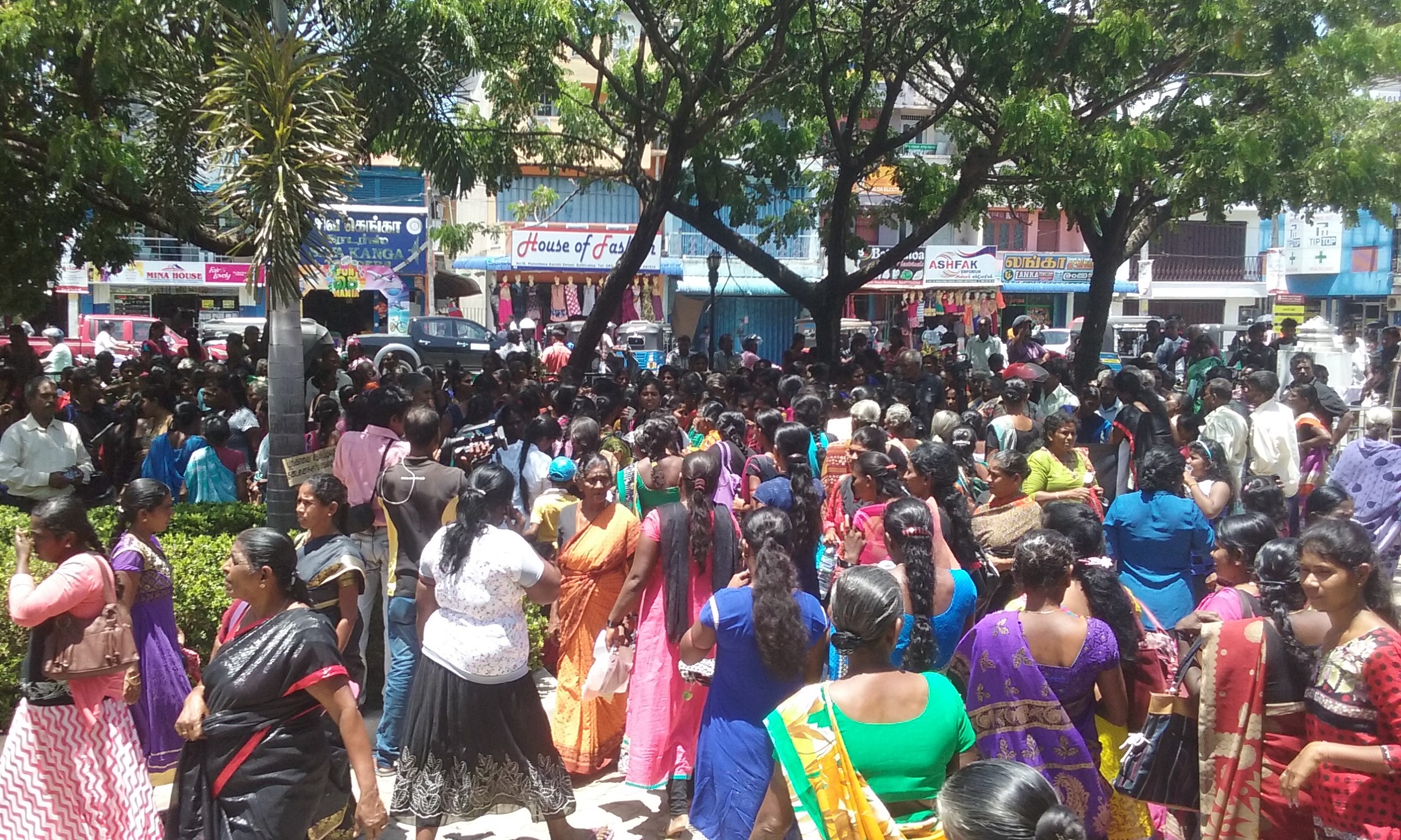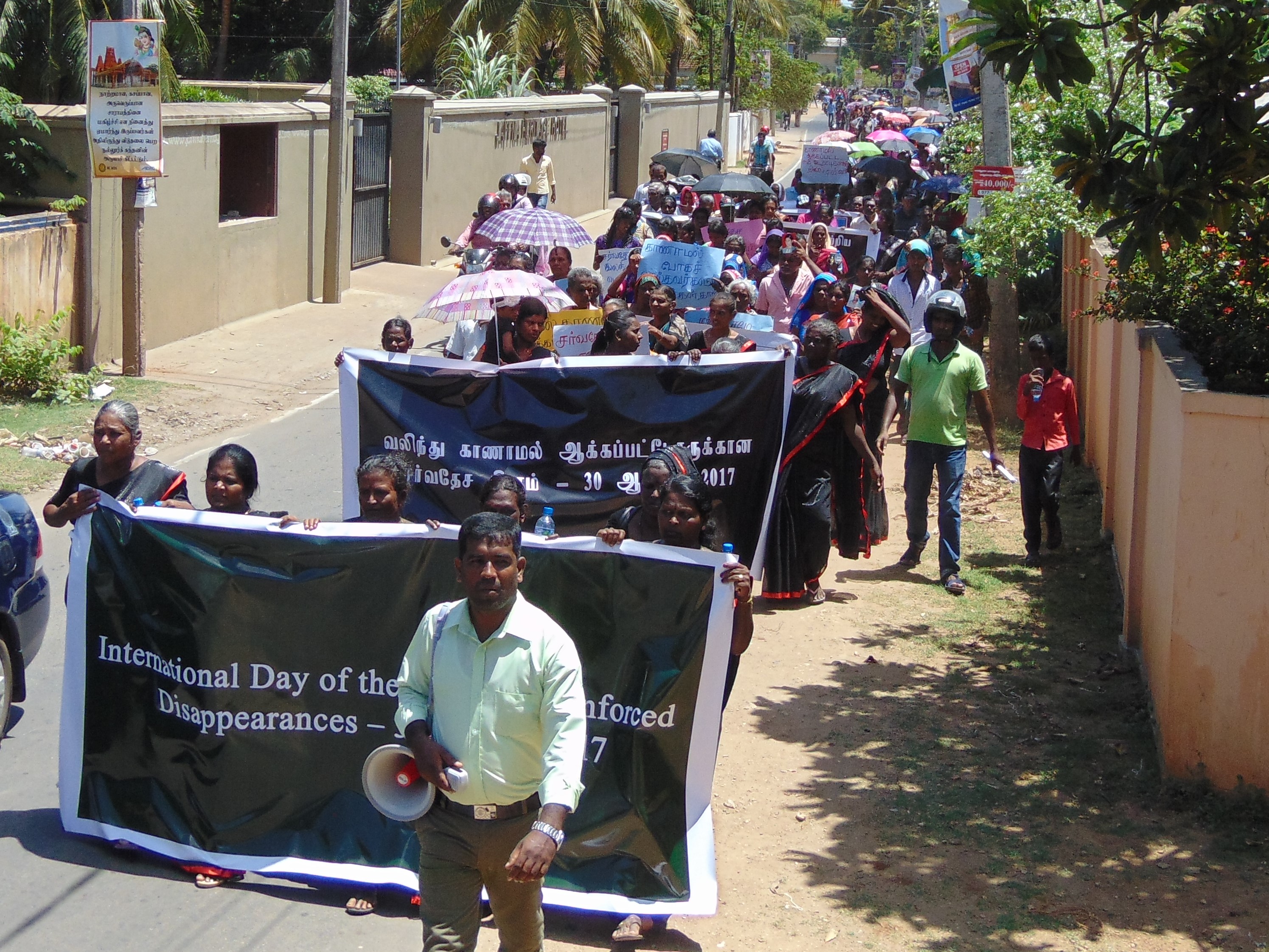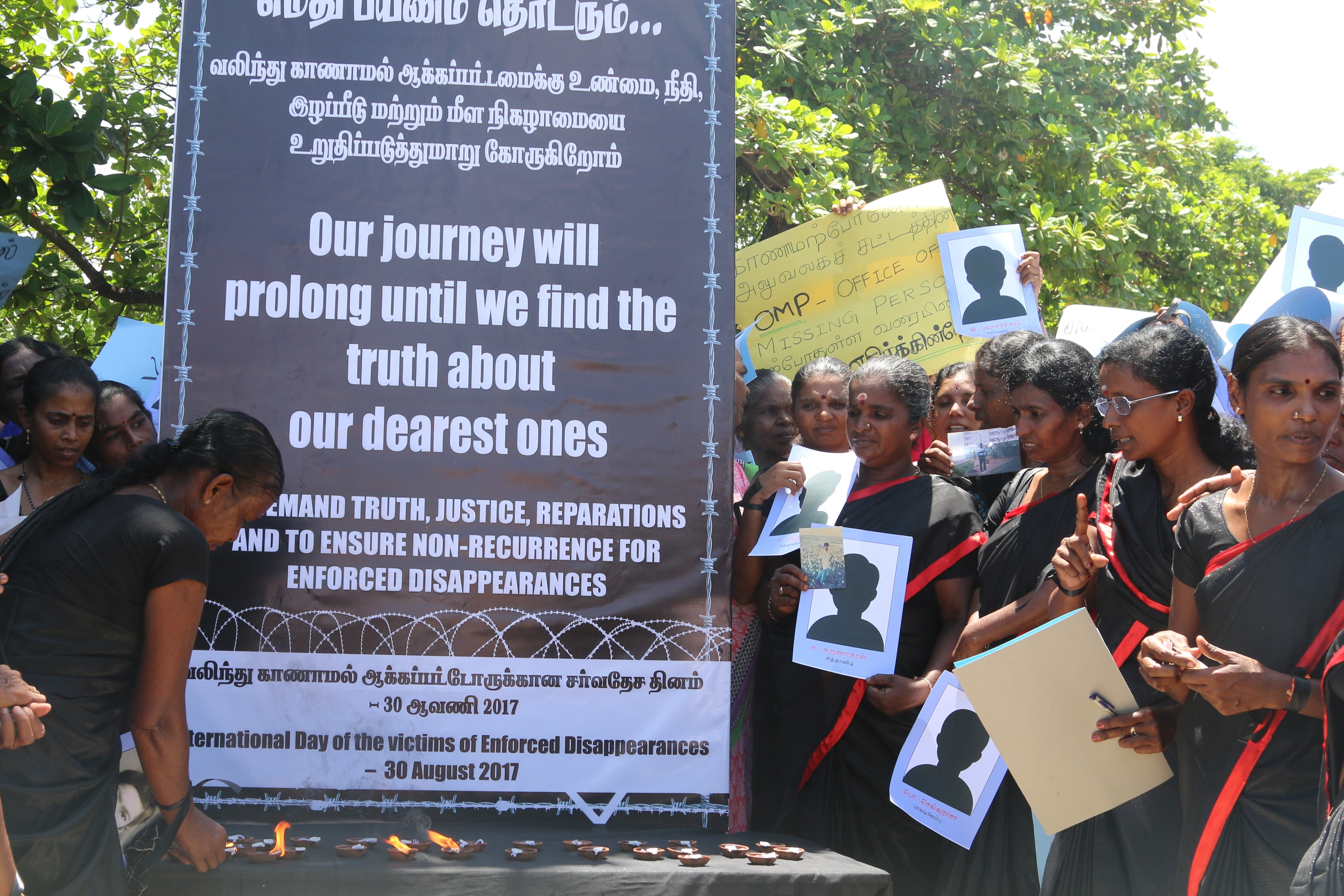OPEN LETTER TO UNSG ANTONIO GUTERRES FROM WAR AFFECTED NORTH & EAST OF SRI LANKA.
Hundreds of people took part in the event in Jaffna.




People marched to the UN office in Jaffna and hand over the letter--The struggle will continue until the justice is delivered
International Day on Victims of Enforced Disappearances was commemorated by the families of disappeared, affected communities and civil society organizations in North and East on 30th August 2017. In Northern Province more than 800 people gathered at the Nallur temple premises in Jaffna and publicly read an open appeal which was addressed to UN Secretary General His Excellency Antonio Guterres. Then the crowd marched to the UN office in Jaffna and handed over the memorandum to the officers there.
In the East more than 900 people, most of them are women family members of victims of enforced disappeared, of all three districts of the province gathered at the Gandhi Park in Batticaloa town and openly made their demands. The memorandum was handed over to the coordinator of the Batticaloa Human Rights Commission office.
Open letter addressed to UN Secretary General His Excellency Antonio Guterres fellows:
International Day of the Victims of Enforced Disappearances.AN OPEN APPEAL TO THE UNITED NATIONS SECREATARY GENERAL HIS EXCELLENCY ANTONIO GUTERRES
We are the families of the disappeared persons in the North and East and the general public along with the representatives of civil society organizations present our unanimous appeal on the International Day of the Victims of Enforced Disappearances (August 30, 2017).
Eight years have been passed since the war was end in Sri-Lanka. But, the issue of enforced disappearances has been continuing as a burning topic in the North and East and Southern areas of the country. Especially, since the families of enforced disappeared persons and affected communities of North and East are searching for their loved ones. Engage in continuous campaigns. Old mothers who have been sitting in the roadsides for months under hot sun and heavy rain with the photos of their missing children and demand for justice is a heart-breaking scenario. But, there is no any promising responses were given from the side of the government.
The good governance regime which came to power in 2015, core sponsored a Resolution (Resolution 30/1)1 with the UN Human Rights Council on 1st October 2015 to ensure truth, justice, reparation and non-recurrence for the war affected communities. The operative article 4 of this Resolution states, the importance of establishing the Office on the Missing Persons as one of the transitional justice mechanisms and receiving international assistance including from the OHCHR. But,
The Office on Missing Persons (OMP) Bill which had been developed without the genuine consultation with affected communities, human rights activists and civil society and gazetted under the direction of the Prime Minister. Later it was passed in parliament as an Act and gazetted on 26 August 20162.
The OMP does not have any judicial power. This will merely act as a body that collects information. The information’s which are collected by OMP cannot be used as evidence in court of law and it cannot be shared with outsiders including the victims 3.
Article 11 (a) of OMP stated, in-order to function efficiently that this office has power to make agreements with any institutions or individuals. But, without any consultation with the affected families and civil society the government made an amendment in the parliament and repealed the power that could be exercised by this office4. Based on the “majoritarian” political stance the amendment was made as such sort of seeking foreign assistance would affect the sovereignty of the country.
Because of this, the OMP could not get the assistance from the Office of the High Commissioner for Human Rights and from other international organizations and experts which was already agreed by the government in Resolution 30/1. Therefore, the OMP will remain as an “empty pot”.
r
2. Establishing an independent special tribunal:
Involuntary and enforced disappearance is a crime against international human rights and humanitarian laws. This is a war crime as well. Operative article 6 of Resolution 30/1 states a special tribunal with international judges, lawyers and prosecutors should be established in the country to investigate the violations against human rights and international humanitarian laws. Therefore, an independent special tribunal should be established to find the truth about the enforced disappeared persons and to trial the perpetrators who are responsible for those crimes. The trials against these crimes must include the period from 1983 to 2014.
The Sri-Lankan government has to take zero tolerance position for enforced disappearances and thereby grant justice to affected communities and to take measures to stop such crimes without taking place in future.
3. Criminalizing the enforced disappearances in the country:
The International Convention for the Protection of All Persons from Enforced Disappearance Bill was gazetted on 9 February 2017. It was scheduled to take up the bill for debate in Parliament on 5 July 2017 but due to political reasons it was not submitted5. Prioritizing the freedom and right to life of entire Sri-Lankan people the Government of Sri-Lanka must enact this law and criminalize enforced disappearances. Thereby the government must grant legal security to the people of Sri-Lanka from enforced disappearances.
4. Establishing an Independent Forensic Science Research Center:
An independent forensic research center must be established in North and East in-order to collect and research the human remains and other material evidences of people who had been victimized to crimes against international human rights and humanitarian laws. The forensic processes (identification of mass graves, exhumes, collecting process of human remains, storing, laboratory reports…etc.) should be transparent to the families of victims and to the public. Therefore, forensic activities should be telecasted and covered by other print and electronic media as well. The findings of the forensic researches should be used as evidences in prosecutions against crimes against human rights and humanitarian laws. Thereby justice must be ensured for victims.
5. Revealing the Truth:
a) Truth about persons who have been disappeared after arrests and abductions:
Since 1983 arrests under Prevention of Terrorism Act had been increased in North and East areas. Several people who had been arrested and abducted by the state agents were not returned. Their families were not given any information about them. Similarly, between 1987 and 1990 thousands of young Sinhala men and women were disappeared in the Southern Sri-Lanka. They also faced the same fate. Other than that, in South, journalists and people who criticized the regime were abducted and made disappeared by state agents during the period of previous regime. Detailed and separate name lists should be released by the government about the disappeared persons of North East and South. This should include whether these people are alive or not and if they are not alive further details should be given such as what happened to them, who is responsible, where are the human remains…etc.
b) Truth about the persons who were handed over to the military during the last stage of the war:
During the last stages of the war several families who moved to the military controlled area handed over their family members to the military for further investigation and these detainees have not returned. Previous regime said that they did not know. The present “good governance” regime also ignoring this issue. Therefore, government should take immediate action to release a detailed name list of these detainees including who handed over the person, to whom, when, where and also the government should officially disclose the present situation of these persons.
6. Reparations:
Majority victims of enforced disappearances in North and East are male members of families that live under poverty. The families depended on the earnings of those men. As these families lost their bread winners the families are economically in vulnerable situation. Therefore, a monthly pension scheme which is manageable to cover their basic needs should be provided to the families of enforced disappeared and this should be equivalent to the average salary of a government servant (Rs. 35,000.00) and should have the same procedures of the government pension scheme. If the victim is un married pension should be given to the parents or un married sisters and for married persons, wife/husband and children are entitled to the pension.
The above proposed pension should be accounted from the day of disappearance of the person and be given with the arrears.
Families those who do not have land or house should be granted housing schemes with land titles.
The family members of the victims should be granted government recommendations to get jobs and grant and loans without interests for self-employments.
7. Psycho social counseling and medical facilities:
Family members of the victims should be given necessary psycho social counseling via divisional secretariat offices and to help them to relax themselves from stress. Where necessary medical assistance need to be provided. Government should grant approval to these government bodies to get support from the social organizations to full fill these needs.
8. Public awareness activities:
Legal and social awareness must be taken place via media to aware the people of Sri-Lanka that the enforced disappearances of persons is a crime. Especially state sponsored television and radio channels must provide special programs on this regard and special advertisements must be taken place.
Positive attitude must be developed about the victims of enforced disappearances and about their families among the people of Sri-Lanka.
9. Enacting Public Interest Litigation:
In future if any single person or persons become victims of enforced disappearances, the right to file habeas corpus litigations must be granted to the individuals and groups who have public interests. Therefore, public interest litigation must be enacted in Sri-Lanka.
10. Ensure Non-Recurrence:
In-order to ensure non – recurrence of enforced disappearances in Sri-Lanka, the government has to rapidly take following measures:
a) Zero impunity for enforced disappearances
b) Reformation activities by terminating and reducing the powers of military personnel, police and government officers who have connections with acts of enforced disappearances and cancelling their remunerations
c) End militarization in North and East areas and rebuild the civil life
d) The Sri-Lankan military has been consisted with more personnel. Majority of them are young men. Even though there is no war the expenses for military is high. Therefore, reducing the size of military by 70% and using these young men’s capacities for positive development of the country
e) The functions of criminal armed groups that closely engaged with the military must be fully banned and they must be removed from political engagements be trialed for their past criminal activities
f) End all sorts of surveillance and threats taking place by the state intelligence against affected communities, human rights defenders and civil society activists
g) PTA is the basic legal back ground for enforced disappearances in North and East. Therefore, it is important to note that the PTA must be reviewed and reformed according to international human rights standards
h) Sri-Lankan government should jointly work with the UN on transitional justice initiatives to build trust among the affected communities on reconciliation
i) A political resolution that would be accepted and satisfactory the minorities of North and East should be made
Further, we appeal Your Excellency to provide necessary guidance to the Sri-Lankan government to fully implement the recommendations made in the report of the UN Working Group on Enforced Disappearances on its mission to Sri-Lanka which held in 2015 November 09 to 18.
Signatories:
Families of the disappeared in the North and East
Families of the victims of mass killings and violence in the North and East
Village based women’s organizations and social organizations in the North and East
Civil society organizations and North East Coordinating Committee
Foot Notes
1. 30/1. “Promoting reconciliation, accountability and human rights in Sri Lanka”, Resolution adopted by the Human Rights Council on 1 October 2015, A/HRC/RES/30/1, Human Rights Council, http://www.mfa.gov.lk/images/stories/pdfs/docs/FINAL_published_-_thirty_slash_one.pdf
2. Office on Missing Persons, Act No. 14 of 2016, Gazette of the Democratic Socialist Republic of Sri Lanka of August 26, 2016, http://www.parliament.lk/uploads/acts/gbills/english/6016.pdf
3. OMP the Facts, http://www.scrm.gov.lk/faq-omp
4. Office on Missing Persons Amendment Act, No. 9 of 2017, Gazette of the Democratic
Socialist Republic of Sri Lanka of July 07, 2017http://www.srilankalaw.lk/gazette/2017_pdf/09-2017_E.pdf
5. Enforced disappearance bill not taken up in Parliament, Daily Mirror, 6 July 2017, http://www.dailymirror.lk/article/Enforced-disappearance-bill-not-taken-up-in-Parliament-132282.html
All photos and the commentary courtesy of the North and East Coordinating Committee (NECC), Sri Lanka.
